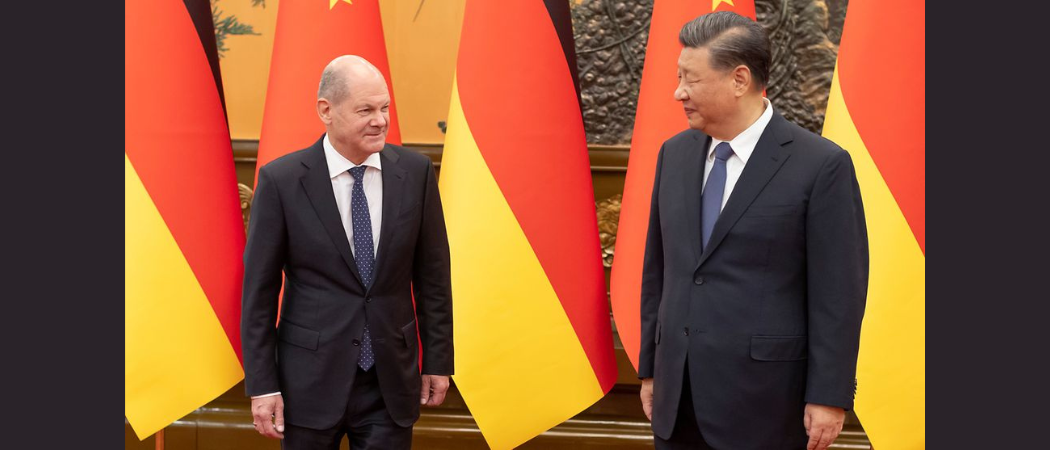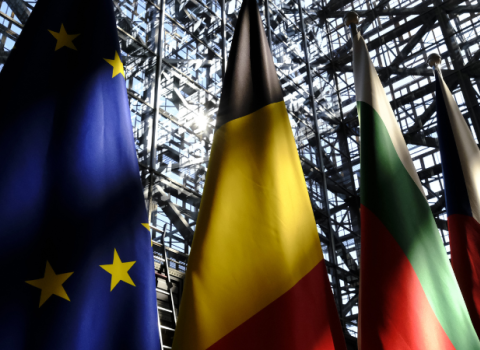The country’s new China strategy warns that Beijing now views even basic research through a military lens. But details on how the new policy will be implemented are lacking, and ministries appear confused over who has responsibility

Chancellor of Germany Olaf Scholz with Xi Jinping, general secretary of the Chinese Communist Party. Photo: German Federal Government / Imo
Germany’s new China strategy has outlined plans to withhold federal support from research projects where there is a risk of “knowledge drain” to China, as well as promising to make German academics better aware of the security risks of cooperation.
The strategy, released on 14 July, is the result of months of bickering between coalition partners in the government. The outcome is a compromise document that aims to “de-risk” links to China without fully decoupling, aligning Germany with the approach set out by the European Commission earlier this year.
The plan contains potentially significant new policy on research and innovation, and warns that scientific relations with Beijing have become unbalanced – again echoing Commission concerns.
Arguably the most significant commitment is to “issue provisions so that [research] projects with China in which knowledge drain is likely are not supported or only supported when suitable conditions are imposed.”
“Limiting federal support on grounds that there is knowledge leakage would be important, but needs to be defined,” said Rebecca Arcesati, an expert on Chinese science and innovation at the Mercator Institute for China Studies, a think tank in Berlin that hosted foreign minister Annalena Baerbock for the launch of the strategy last week.
It’s unclear whether “knowledge drain” would only apply to research with potential military or perhaps surveillance use, she said, or whether the scope would go further, and encompass risks to German economic competitiveness. Either way, it seems that the new policy should only affect federally funded research, rather than all academic work.
“The work will now start at the Federal Ministry for Education and Research [BMBF] and other ministries to work out exactly what we are talking about,” said Arcesati.
Ministerial ping-pong
A spokeswoman for BMBF said that it is “currently reviewing internal procedures for handling dual use research of concern, which includes a debate about how to handle the knowledge drain issue.”
But as consultations are ongoing, “we are unable to provide further details”, she said, directing Science|Business to the Federal Ministry for Economic Affairs and Climate Action.
However, a spokesman for this ministry said it is “beyond our area of responsibility” to answer questions about research with China.
Aside from the promise to limit federal support for knowledge draining projects, the China strategy also contains several broadsides at Beijing over what Berlin sees as an unfair one-sidedness in the research relationship.
“The Chinese Government is impeding access to civil society, the media, research institutions and governmental agencies to an ever greater extent,” the strategy says. German research in China is increasingly being stymied by “censorship and administrative measures”, it warns.
Imbalances
The German government also wants China to remove “existing imbalances concerning access to major Chinese research institutions”.
Asked to clarify, a spokeswoman for the BMBF said that in recent years China had shown “little interest” in participating in new European-led research infrastructures, particularly those based in Germany.
“At the same time, China is planning several large research facilities which can compete directly with German and European facilities,” she said.
The strategy also warns that China is turning even basic research to military ends. “China’s military-civil fusion policy is placing limits on our cooperation,” the strategy says, referring to Beijing’s aim to interlink its civilian economy and defence industry. Military civil fusion has been seized upon by politicians in the US too, although some experts point out the policy is far from fully realised yet.
“We are taking into account the fact that civilian research projects, including basic research, are also being considered by China in strategic terms with respect to their military use,” the German strategy says.
Responding to the strategy last week, a spokesman for China’s foreign ministry called it “counterproductive” and said it smacked of German “protectionism”.
Evolving policy
The strategy is the culmination of years of increasing concern over German research cooperation with China. In 2020, the German Rectors’ Conference put out fresh guidance on dealing with the country as censorship and legal hurdles grew.
A string of media investigations and reports have also revealed that German academics have freely cooperated on dual use technologies, sometimes with militarily-linked Chinese institutions.
And last month, Germany’s domestic intelligence agency warned China is Germany’s “greatest threat in terms of economic and scientific espionage”, citing research cooperation as one way Beijing hoovers up German technology and knowhow.
“Perhaps surprisingly, quite a few scientists have lately said that they would actually appreciate some kind of political guidance that would at least reduce the general uncertainty, which is always detrimental to international scientific collaboration,” said Almuth Wietholtz-Eisert, who focuses on China research relations for Germany’s Leibniz Association of research institutes.
The main question was now how the strategy would be implemented, she added.
Even before the publication of the strategy, some academics in Germany had already begun to shy away from research collaboration with China, said Wietholtz-Eisert.
Some were put off by rather opaque new Chinese laws on data protection and national security, and some by newly introduced administrative burdens at home. “And some said that they were increasingly irritated at being surveilled when working in China,” she said.
However, in Germany – as in most countries - even sensitive research collaboration with China is permitted and pursued as long as it constitutes basic research, said Wietholtz-Eisert.
Arcesati said EU export controls laws are out of date, and lack strong guidance in sensitive areas like artificial intelligence and quantum technologies.
However, the new German strategy commits to adjust export control lists “against the backdrop of new technological developments, e.g., in the cybersecurity and surveillance technology fields.”
Some universities were crying out for clearer export controls that would allow them to block certain research projects with China that are dual use, she said.
UK intelligence report
On 13 July, the UK’s Intelligence and Security Committee of Parliament released a substantial report into Chinese influence in the UK, focusing in particular on the country’s penetration into universities and the technology sector.
“The UK’s academic institutions provide a rich feeding ground for China to achieve both political influence and economic advantage,” the report, which draws upon interviews with the UK’s intelligence agencies, concluded.
The more than 100,000 Chinese students in the UK give Beijing considerable economic leverage over UK universities, it said. Intelligence agencies reported that UK vice chancellors would sometimes get calls from Chinese officials attempting to stop them hosting speakers on issues like Tibet or Xinjiang.
It also identified holes in the UK’s export control rules. “Emerging technologies without established military use are often not covered,” it warned.





 A unique international forum for public research organisations and companies to connect their external engagement with strategic interests around their R&D system.
A unique international forum for public research organisations and companies to connect their external engagement with strategic interests around their R&D system.